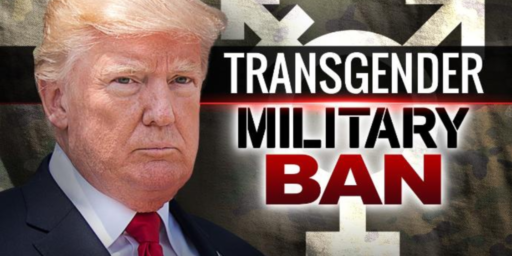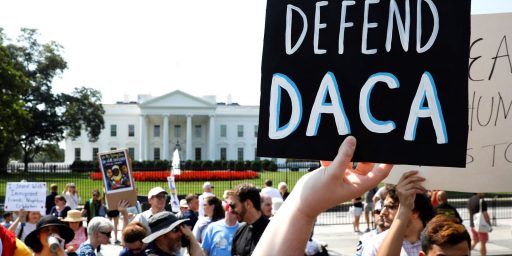Trump Wants End to National Injunctions from Lower Courts
A longstanding legal question may finally come to a head.

The headline “Trump seeks to limit judges’ powers on injunctions after legal blows” seems ominous—another case of a petulant President seeking to shed longstanding norms when he can’t get what he wants. The reality is more complicated.
President Trump is looking to stop lower courts from being able to issue wide-ranging injunctions in a move that could dramatically limit the authority of judges.
The plan comes as groups opposed to Trump have been able to get several of his policies, including those seeking to limit immigration, put on hold by nationwide orders issued by lower courts in battles that were eventually decided by the Supreme Court.
Advocacy groups that have pushed judges to issue nationwide injunctions say they are necessary to protect people from policies they see as harmful, and some legal experts agree, arguing that the right to issue such actions is protected under the Constitution.
But opponents argue that injunctions should be applied more narrowly to groups that are directly impacted, saying the more liberal use of injunctions is hurting the judicial system.
This is a perfectly legitimate question. Indeed, I’ve often questioned the wisdom of allowing lower court judges to overrule national legislation such as the Affordable Care Act. It’s one thing to rule in a specific case—their remit—and quite another to serve as a one-man Supreme Court, if only temporarily.
Vice President Pence this week brought the issue front and center, saying in a speech to the conservative Federalist Society that the administration has been “unfairly” targeted by injunctions — and promising to unveil in coming days pathways to put the issue before the Supreme Court.
“So I say to all those gathered here: For the sake of our liberty, our security, our prosperity and the separation of powers, this era of judicial activism must come to an end,” Pence said. “The Supreme Court of the United States must clarify that district judges can decide no more than the cases before them.”
Again, this is perfectly within bounds. Pence isn’t suggesting that the President is going to stop obeying orders from lower courts. He’s merely seeking a ruling from the highest court in the land on judicial power.
Pursuing an end to nationwide injunctions would mark the latest attempt by President Trump to shape the federal courts after getting two Supreme Court justices confirmed and more than 100 of his judicial picks installed by the Senate.
Aside from the underhanded means by which Senate Republicans kept the seat open for Trump, there’s nothing unusual in the least about Presidents appointing judges to vacant seats. Describing it is some sort of master plot is silly.
Trump opponents have argued that nationwide injunctions are necessary to protect people who may not be part of a lawsuit but would nonetheless be impacted by a particular policy or legislation.
“When the extent of the harm is nationwide, the relief should be nationwide,” Sasha Buchert, a senior attorney for the LGBT rights group Lambda Legal, told The Hill.
She pointed to the ban on transgender service members as an example of a national policy that the group was able to fend off by convincing a judge to issue a nationwide injunction, arguing that more soldiers than those filing the lawsuit would have been impacted by the action.
The administration eventually implemented a more limited form of its ban on transgender service members.Meanwhile, Cecillia Wang, a deputy legal director for the American Civil Liberties Union, said the administration’s effort to limit the scope of injunctions “is simply to stand in the way of justice.”
Wang also argued that the power to issue nationwide injunctions is protected under the Constitution.
“I can’t take seriously the vice president’s threat to undo what the founders of the country, the framers of the Constitution intended, which is to have a safeguard against unlawful executive branch action,” Wang said.
Buchert’s point strikes me as perfectly reasonable: there are cases where limiting the ruling to the specific case in controversy would do real harm.
But Wang is being disingenuous. The framers of the Constitution had no opinion whatsoever on this matter. Not only is judicial review nowhere mentioned in Article III, whether lower courts would exist at all was left up to the discretion of the Congress. (Then again, creating lower courts was among the very first acts of the first Congress.) And the Supreme Court itself didn’t strike down an act of Congress until 1803—fourteen years into the Constitutional era—and didn’t do so again until 1857. Surely, it was not intended for lower courts to do so routinely.
But other legal experts oppose nationwide injunctions. They argue that judges’ rulings blocking policies should apply only to those behind the legal challenge and that courts are overstepping their bounds by issuing wide-ranging injunctions.
Samuel Bray, a law professor at the University of Notre Dame who has been vocal in his opposition to national injunctions, said such sweeping orders “take the courts outside of their constitutional role.”
He argued that district courts were designed to rule on matters involving specific parties and not an entire nation. And if individuals in a lawsuit want the order applied nationally, Bray said, they could always file a class-action lawsuit to do so.
“Everybody in the class will win or lose together,” Bray said. And he noted that if one party loses its case for a national injunction before one judge “someone else can take another bite at the apple in another court.”
Nicholas Bagley, a law professor at the University of Michigan who is similarly opposed to nationwide injunctions, said policies that are challenged in court deserve to undergo a “robust” review in the courts and should not simply be put on ice by the ruling of a single judge.“What I struggle with is why anyone would support handing to judges the authority to put a halt to important government programs just because they happen to get their knickers in a twist about a particular case,” Bagley said.
Indeed, one problem with the current situation is the ability of litigants to judge shop—filing cases in jurisdictions where a sympathetic ruling is likely. And, as Bray hints, there’s also the ability to get multiple bites of the apple, filing case after case until one gets a ruling one likes. There are some 673 district court judges, after all.
It’s unclear how the Supreme Court would rule if the question does land before it.
Justice Clarence Thomas, a conservative appointed by former President George H.W. Bush, has previously called for the Supreme Court to take up the issue of national injunctions if they continue to be used in the legal system.
But some experts say the rest of the court may be wary of deciding to take away a power from judges that is currently used throughout the United States and that enjoys a strong legal precedent.
It would also be hard to get a case before the Supreme Court that allows it to rule solely on the constitutionality of national injunctions since challenges to injunctions are often part of broader cases.
That means the justices could effectively dodge the issue, ruling on the merits of an injunction as it applies to a specific case without necessarily ruling on the wider constitutionality of nationwide injunctions.
I have no opinion on how the court would rule. Cynics will argue that, with Justice Brett Kavanaugh on the bench, they’ll simply rule however the Trump administration wishes. But Chief Justice Roberts clearly has a longer vision than that, understanding the need to preserve the legitimacy of the judiciary.
Legal experts also noted to The Hill that parties out of power have long supported injunctions, while those in power have opposed them.
Democrats and the Obama administration, for example, opposed national injunctions when they were issued in response to some of the former president’s policies, such as ObamaCare and the Deferred Action for Childhood Arrivals program.
“The party who holds the presidency doesn’t like them. And the party who’s out of power does like them,” Amanda Frost, a law professor at American University, told The Hill.
Frost said she supports the existence of national injunctions. But she said that judges should be cautious in issuing the orders and only do so if they feel it’s necessary to protect a wide range of Americans wrongly impacted by a federal policy.
But she rejected the argument made by Pence and others that one federal judge should not be allowed to make a ruling that can impact the entire nation.
“That’s how our district courts work. A single judge gets to decide lots of sweeping questions about policy that are applied nationwide,” Frost said.
And she noted that the Trump administration can always appeal a judge’s ruling and receive a stay on an injunction, as it recently did over an order that would have paused a Trump policy requiring some asylum-seekers to remain in Mexico as their cases are processed in the U.S.Ultimately, Frost said, conservatives who are now seeking to limit injunctions may come to regret it should the Supreme Court rule in their favor.
“It’s shortsighted to get rid of them and say, ‘Well, that will produce more policy that I like.’ It might well not,” she said.
Frost may well be right.
Oddly, while I have written several posts of late arguing that the problem with our system is the politicians, not the Constitution, this may be a case where the institutions of 1789 simply don’t work.
While it’s debatable whether the Framers could envision a continental nation of 330 million people and 50 states, they certainly had no conception of anything like the modern regulatory state. There are relatively few laws being passed by Congress but regulations from the bureaucracy implementing those laws are legion. It really makes no sense to have district court judges weighing in on those.
Ultimately, we likely need a separate track entirely for such questions. I’m agnostic as to whether that’s a specialized court that has original jurisdiction over challenges to national-level injunction requests, a Supreme Court that fast tracks those sort of cases, or something else. But elected Presidents shouldn’t have their policies stopped at the whim of a random judge with a lifetime appointment.






Ridiculous framing.
Someone has to decide. Why shouldn’t it follow the same methodology as all other legal disputes?
Should corporations that practice in multiple jurisdictions only be bound by a court’s ruling in a single jurisdiction? If not, why is it different when the defendant is the government?
Should aggrieved parties really need to bring 94 separate suits – one in each federal district court? What a complete waste of resources.
If you think the current stakes for judicial appointments are high now…
This idea isn’t even half-baked…
“Aside from the underhanded means by which Senate Republicans kept the seat open for Trump”
Kind of like “aside from hat Mrs Lincoln, how was the play?” I hope you mean seats, not just the Merrick Garland nomination as McConnell held back confirmation on lower court judges as well.
“Democrats and the Obama administration, for example, opposed national injunctions when they were issued in response to some of the former president’s policies, such as ObamaCare”
In the case of Obamacare, it had the votes of 60 Senators from states that held about 67% of our population. Using injunctions against laws passed by Congress also strikes me as something that should not happen very often. OTOH, injunctions against executive actions, where one man (POTUS) has passed a rule, doesn’t seem like necessarily such a reach. We need something to provide balance and serve as a check.
Steve
We effectively used to have this in that it used to be the case that most challenges to Federal law or the actions of Federal agencies were filed in the Federal District court in Washington, D.C., which means they would be appealed to the Court of Appeals for the District of Columbia Circuit. Most still are, which is why that court is often referred to as the second most important in the country. However, both Republican and Democratic states that have challenged the actions of given Administrations (Obama or Trump) have gotten into the habit of seeking more favorable venues. For conservatives it has been the Fifth Circuit in general and Texas in particular. For the left it has been the courts of the Ninth Circuit and, to some extent, New York City and the 2nd Circuit. Perhaps it would not be a bad idea to provide, by law, that all challenges to Federal law or action (or at least those filed by states or localities) must be filed in the D.C. Circuit.
@SKI:
I’m not sure I follow. Typically, they’d bring suit in the district in which they reside and get a ruling on their specific case. Aside from class actions, rulings in particular lawsuits seldom apply nationally.
Because the actions of the elected President and Congress are in a different category than ordinary citizen-on-citizen disputes. They literally impact the entire country, not just the parties in that case.
@SKI:
I’m not sure I follow. Right now, every single judge seems to have the power to govern the entire country unless overruled. I’m saying that we should have either a super-admin law court that handles these cases or that the government should get a SCOTUS ruling right away on the injunction. The overall case would still wind up through the courts for ripeness but injunctions would be a different track.
@steve: I agree that overturning acts of Congress should be rare and that Executive Orders are less sacrosanct. Still, Presidents are elected nation-wide.
@James Joyner:
You would apparently be surprised by the number of times this happens – especially in IP law
Are they? What about Apple vs Qualcomm? You don’t think that fight, recently settled, had major implications for a whole lot more people than the litigants themselves?
And what about class-actions? You just can’t hand wave away a major class (pun intended) of lawsuits where this would be an issue.
They all have the *chance* but practically most will never have the opportunity and the rest only extraordinarily rarely. But when a seat comes up on that “super-admin law” bench that you *know* is going to hear such cases? Batten down the hatches…
Oh, and turning SCOTUS into a fact-finder is a notoriously bad idea. They don’t do it very often and they are bad at it.
@SKI:
But that’s not a single district judge issuing a national-level ruling. It’s the litigants resolving a major dispute themselves.
What about class-actions? They’re by definition a bundled case that’s winner-take-all. It’s completely different than individual litigants judge shopping across the land.
As Doug noted upthread, it used to be common to relegate these cases to the DC Circuit. I’d be fine with simply formalizing that.
@Doug Mataconis:
I think this makes a lot of sense. It would also make sense to set up the D.C. District/Circuit to fast track these types of cases to Circuit review to help with the issue that James raised about this resting too long on the decision of a single judge.
The broader problem is that this really points out the limits of the federalism when it comes to the Judiciary and the limits of executive power.
One more thing. By keeping the current structure we get multiple bites at the apple to get it right.
1. Multiple district courts can weigh in and provide different perspectives. If they all come down the same way, that also means something.
2. It also allows for different litigants with different issues/concerns/approaches. A singular court likely loses, or at least minimizes, this aspect.
3. We get Court of Appeals reviews, sometimes multiple ones to correct errors by the trial court. Who, before SCOTUS, do we have in your preferred system? and would the appeal to SCOTUS by by right or permissive? Would there be effective appellate review?
@James Joyner:
What are the implications to plaintiffs scattered throughout the country? What happens to the Constitutional right to redress of injuries if you are a poor individual in Alaska? DO you have to travel to DC?
What specific problem are you trying to solve? What additional problems does your solution create? Why do you prefer the new problems?
@SKI:
I’m not advocating getting rid of the current structure entirely. I agree that there’s often something to be said for ripeness and conflicting decisions from different circuits tends to produce that. The issue here is injunctions that apply nation-wide on the whim of a single, shopped-for judge.
They also shouldn’t be able to ignore laws and treaties at the whim of a man child who happens to occupy the WH.
@James Joyner:
If only.
Question: If all these cases had to be filed in the DC Circuit, would they need an expansion? Or would the infrastructure in place the last time this was the case be sufficient to handle the increased case load?
I think Jefferson in particular envisioned westward expansion, but explicitly stated what would come of it would be new nations, “sister republics.”
I think it does. If regulations have the force of law and are enforced as law, then where else can a citizen appeal for relief? Further, if regulations were exempt from judicial review, then any agency, or any president through any agency, could simply violate the Constitution in ways large and small at any time for any reason, and three’d be no recourse against it.
As to injunctions, either the law applies to everyone equally or it doesn’t. If it does, then any violation of the legal order by any law should be void for everyone, not just those who are party to a lawsuit.
@James Joyner:
You keep saying “whim”. If we have judges deciding cases on the basis of whims, they should be removed from the bench and impeached. If that is the problem, this isn’t the solution.
@SKI: The whole “whim of a judge” thing just reminds us you can take a person (or they can take themselves) out of the GOP, but it’s hard to take the GOP out of the person.
@SKI:
I use “whim,” as is customary in this context, to describe the idiosyncracies of having a case heard by a particular judge rather than a charge that the individual judge is acting capriciously. It’s major, if unavoidable, flaw in the system. (More later in this comment.)
@Mikey:
That elected officials, not unelected judges, should make public policy is a standard conservative position but I don’t know that it’s a partisan one. A quick Google search turned up this as the first substantive result:
Neither author seems to be a Republican given their politics. Nimni in particular lists as a claim to fame “Oren’s legal practice focuses on cutting-edge constitutional litigation on behalf of people of color and immigrants. Oren is currently litigating the first lawsuit filed in the country against the Trump Administration to save TPS on behalf of Haitian, Honduran and Salvadoran immigrants. He is also litigating the first lawsuit filed in the country to block federal officials from conducting immigration arrests in state courthouses.”
@James Joyner:
That isn’t the definition of whim. Nor is it customary “in this case” except by folks who are trying to influence the outcome of debate through appeals to emotion, not logic or reason.
More to the point, that flaw doesn’t go away under your preferred scheme – it just gets amplified by having the same Judge(s) hear all the cases.
In truth it sounds like you just want to do away with judicial review – that pesky aspect of societies rules by law. It sounds to my ears like you are saying “How dare those judges thwart the will of the majority and protect the rights of the minorities.”
Judges protecting rights isn’t making “policy”.
Maybe Presidents shouldn’t be trying to implement unconstitutional policies so often.
The injunctions are only a “problem” with regulations and policies were never subject to a vigorous debate, and which hurt a significant number of people. That’s exactly when we want to slow things down.
Here’s a preposterous example — President Hickenlooper orders that all Republicans be rounded up and stuck into FEMA re-education camps. Do we want that executive order in place and active in parts of the country while it works it’s way through the courts? What happens when one district judge says “sounds good to me”?
If this sounds too absurd, what about a national registry of Muslims? Trump was suggesting that.
@mattbernius: Got no dog in the fight about hearing cases that have national bearing in DC except to note that while I was in Korea, most cases that had national bearing seemed to be heard in Busan rather than Seoul. The thinking seemed to be that cases that had national importance or involved government needed to be heard in a venue that would be less influenced by the politics of the national capital.
With that being a consideration, perhaps New York, Philadephia, or Chicago might be better choices?
I see this issue as a symptom, not a problem in and of itself. It’s a symptom of greater Congressional disfunction, the growth of executive power, the growth of the federal rulemaking (shadow legislation), and increasing partisanship.
Well, of course. That’s normal partisan ends-justify-the-means thinking.
Personally, given the level of executive power and how Presidents and people who are running to be President talk and act, I’m reluctant to take away this check on executive authority.
At most I’d like to see an expedited appeal process for these injunctions, so they have adjudicated more quickly.
But we have too few checks on executive authority right now, so despite the flaws, I think national injunctions should stay.
BTW, whatever the merit of national injunctions, in this case it’s just another instance of “Trump wants to end all checks and balances on his power.” That’s reason enough to keep such injunctions until at least the time he leaves office.
@Gustopher:
That’s something I’d want fast-tracked to the Supreme Court, to be honest.
@SKI:
It’s how it’s routinely used to describe the situation described by Rennix and Nimni: judges operate little fiefdoms and the outcome of individual cases are at the mercy of their peculiarities.
Lots of societies that have rule of law don’t have judicial review in the sense we do here. I don’t love the way we do it, where the outcome depends mostly on which political party appointed the justices. But at least the Senate gives scrutiny to Supreme Court nominees and a majority of that body is a much better check on overreach by the other branches than a random district court judge.
Which is to say, I like the theory of judicial review but not necessarily the practice. It’s absolutely possible for a law to make it past both Houses of Congress and the desk of the President and still be unconstitutional. Occasionally, that’s 9-0 Supreme Court majority obvious. Too often, though, it depends on the partisan makeup of the court or, dare I say it, the whim of the least reliable Justice—O’Connor, Kennedy, Roberts, etc. That’s government by the bench, not the Constitution.
@just nutha:
I tend to think that this is a bit of slight of hand. Ultimately, if you have a single district/circuit hearing everything, then whichever district/circuit is chosen will always be the subject of intense political focus.
I guess the only way to get around that would be to completely randomize where specific cases are heard.
@Mikey: Hear! Hear!
@James Joyner: What gets fast tracked and what gets slow tracked? How much harm has to be caused first?
The current process is clumsy and awkward, and sometimes inconvenient, but effective. It protects people’s rights against an aggressive executive.
I’m hesitant to endorse changing the process without adding new, better checks to the executive.